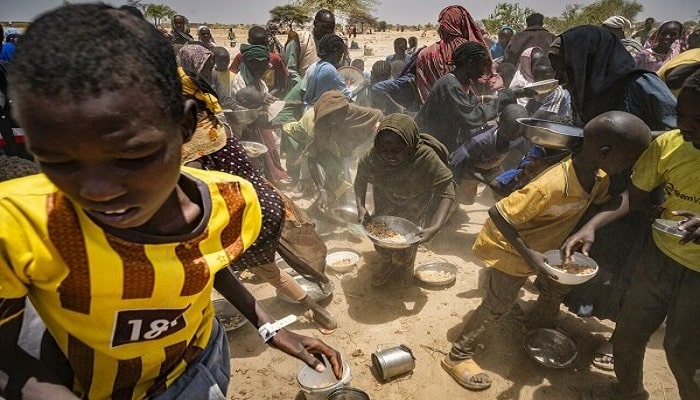PNN – A news-analytical website, in conversation with people fleeing the Sudanese city of Fasher, examined the details of the tragedies that the people of this city have faced.
According to the report of Pakistan News Network, citing the news-analytical website Al-Arabi Al-Jadeed, The city of Fasher, in the center of Sudan’s North Darfur state, has become a symbol of humanitarian disaster, putting civilians on the brink of gradual death. Rapid reaction forces have destroyed the people’s last hopes, namely the takaya (charity centers) and the remaining markets and hospitals, which has doubled the suffering of the people. Humanitarian organizations also continue to face severe restrictions and the risk of death in providing services to citizens.
Due to the critical situation in Fasher, many residents are trying to leave the city, which has come under the control of the militias. However, the militias have blocked the exit routes for citizens from Fasher. In an interview with Al-Arabi Al-Jadeed, the displaced people in northern Sudan described the living conditions as catastrophic.
Read more:
Nerve gas was used against Sudanese civilians during the attack on El Fasher
Looting and starvation
Militants in the besieged town of Fasher have used the weapon of starvation and closed down the markets, markets and simple businesses that citizens depend on for their daily livelihood, according to accounts from several people who fled to the town of Tawaleh, 60 kilometers from Fasher.
One of the escapees, who did not want to be named, says: We faced all kinds of torture, starvation, and killing, and even handcarts pulled by animals and used by the elderly and displaced children were not spared. He added: They killed animals and burned trees and prevented us from leaving. The militias looted our remaining possessions.
Ms. Nafer Mahmoud says that he and his children were able to leave the city last Thursday after the situation deteriorated. She said: Fasher has become a ghost town, movement is dangerous and often forbidden, and all basic services, including water and food supplies, have been destroyed. Markets are closed, making life difficult, especially for children and the elderly. They have looted our homes.
Mohammed Osman, one of the officials of the charity centers in Fasher, which are called “Tekaya”, says that Tekaya was the only shelter that citizens in Fasher relied on. After the militants arrived, all the facilities on which Tekaya operated were destroyed and some of them were shut down, many of those who provided services were killed. In this way, the militias deliberately starved people to death. He said: The Tekayas would provide people with one meal a day, and sometimes, due to the lack of water and firewood, we would distribute whatever vegetables were available to the citizens without cooking them.
Receiving money and harassing women in exchange for leaving Fasher
Refugees say that rapid reaction militias are forcing people to pay millions of pounds for permits to leave Fasher, and they are also conducting body searches of women to obtain money, jewelry or communication devices. “Aisha Ismail” is one of these women who describes her story as follows: We did not expect the rapid reaction forces to search and rape women to obtain money and gold. All the escapees have nothing and are exhausted by hunger and lack of healthcare.
She added: The situation is out of control, in cases where women do not have money to pay, they are forced to hand over one of themselves to the rapid response elements in exchange for the departure of the other women. The United Nations High Commissioner for Refugees announced that the city of Fasher is witnessing an unprecedented escalation of violence, which has led to the displacement of about 260,000 people.
Aid workers are facing increasing challenges, including arbitrary detention and harassment, while some reports suggest that around 15 tons of medical supplies ready to enter Fasher have been blocked by rapid response forces. A health official in Fasher who managed to escape said that hospitals and health centers had been destroyed, medical equipment had been destroyed, and medicines had been looted. All the patients in the hospitals had been killed under the pretext that they were war wounded affiliated with the armed forces.
“Marwan,” a journalist, who did not want to be named, said that the humanitarian disaster in Fasher was escalating, with citizens eating leaves because there was not enough food. He stressed that medicine and even serum were hard to find. The militants burned warehouses, looted livestock and houses, and destroyed all service facilities, water wells, hospitals, and markets.

